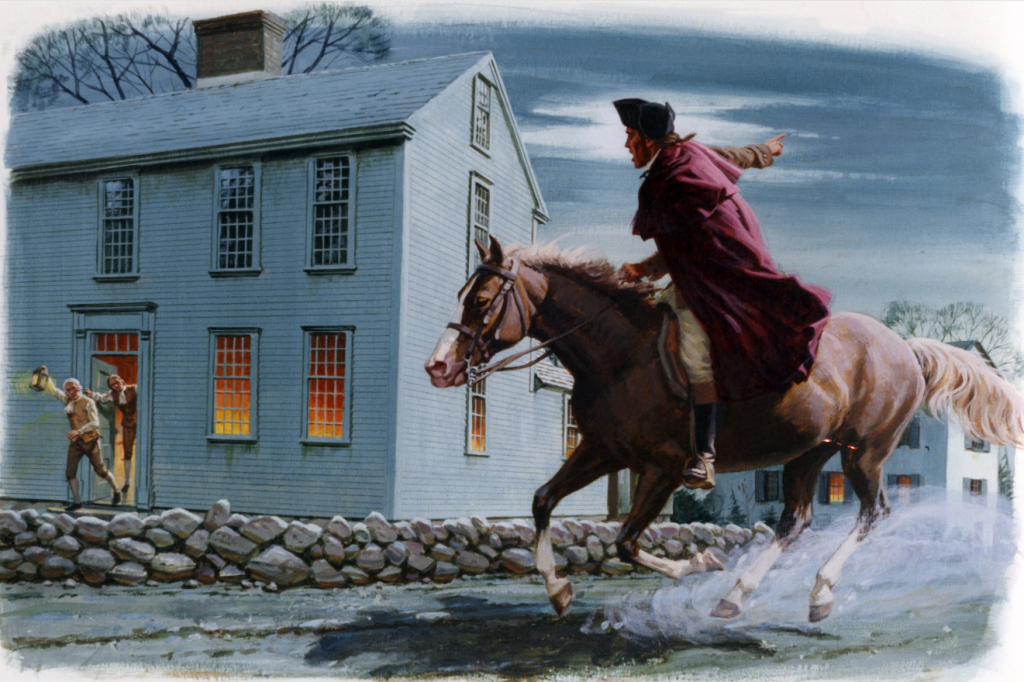The American Revolution didn’t just happen overnight; it was a series of tense moments that built up over years of colonial dissatisfaction with British rule. One such pivotal moment occurred on April 18, 1775, when British General Thomas Gage, stationed in Massachusetts, learned of a weapons cache hidden by local militias in Concord, located 21 miles from Boston. Determined to disarm the colonists and arrest members of the local “Committee of Correspondence,” Gage dispatched 800 British soldiers for a nighttime raid. However, the British underestimated the speed of the colonists’ response.

A network of colonial spies, including the famous Paul Revere, managed to warn the local militias. These militiamen, known as the “Minutemen,” were prepared to defend their towns at a moment’s notice. That very night, the Minutemen sent messengers to Lexington and Concord, alerting them of the British approach.
By the morning of April 19, the British troops encountered a small group of Minutemen in Lexington. Without warning, the British opened fire, killing and wounding several colonial soldiers. This marked the beginning of the Revolutionary War, with the first official shots fired in Lexington. The British then continued their march to Concord, where more clashes ensued. By the end of the day, the British had suffered 273 casualties, while the colonists lost 93 men.
As tensions escalated, King George III declared the colonial rebellion illegal on August 23, 1775, vowing that he would “rather lose the crown on his head than give up the war.” By December, the British sent a massive force of 50,000 troops to quash the uprising. But by then, the colonies were already organizing their own response.
On June 15, 1775, the Second Continental Congress convened and made a landmark decision: the formation of the Continental Army, with George Washington appointed as its commander-in-chief. Along with this, they began issuing paper money and took over the administrative control of the colonies. This was more than just a military response—it was a declaration of independence in the making.
Meanwhile, in the north, American forces were engaged in military operations to prevent a potential British march southward through Canada. On November 12, 1775, General Richard Montgomery led a successful campaign to capture Montreal. However, the attack on Quebec City in December failed, and Montgomery was killed in the battle. Despite this setback, the Continental Army’s push into Canada forced the British to keep a substantial portion of their military in Canada, weakening their forces in other key regions.
In the siege of Boston, British forces were surrounded by colonial militias for 11 months and were finally forced to retreat in March 1776. Just a few months later, the Continental Army successfully repelled British forces from Charleston, South Carolina, preventing them from establishing a southern base of operations.
Yet despite these early successes, peace talks failed, and by July 2, 1776, the Continental Congress officially declared the 13 colonies’ independence from Britain. Two days later, the Declaration of Independence was adopted, marking the formal birth of the United States of America.
The Legacy of the Revolution: Then and Now
The battles of Lexington and Concord were not just the opening salvos of a war—they were the opening acts in a revolution that would inspire countless other struggles for freedom and independence. The colonial militia’s courage in the face of overwhelming odds set a tone for the American Revolution: that of resilience, strategy, and, most importantly, the will to break free from tyranny.
The effects of the Revolution are still felt today. Beyond the immediate birth of the United States, the American Revolution set in motion ideas of democracy and self-determination that would influence revolutions across the world. Countries like France and Latin American nations looked to the American model as they fought for their own independence.
In modern times, the American Revolution’s values of liberty, equality, and the right to self-governance remain cornerstones of the nation’s identity and continue to inspire democratic movements worldwide. The Shot Heard Around the World didn’t just change the fate of the American colonies—it ignited a global pursuit of freedom and justice that resonates in every corner of the world today.

No comments yet.